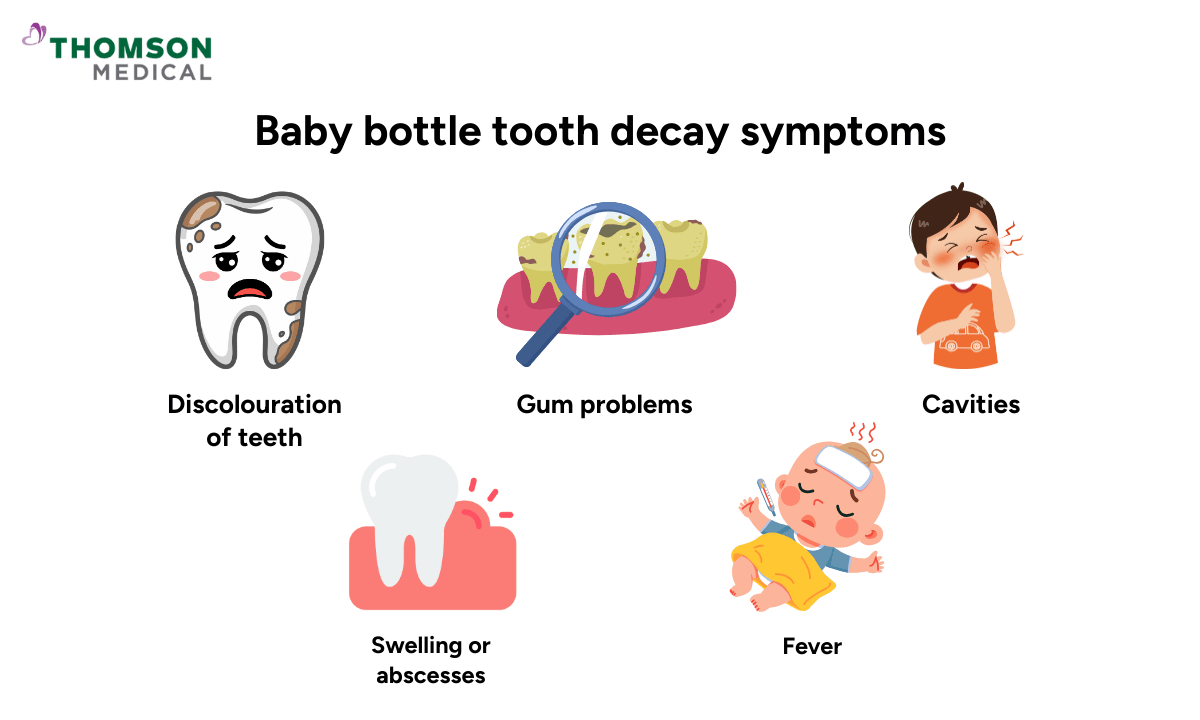Giving your baby a bottle of milk at night to help them settle might seem harmless, but it can lead to white spots appearing on their teeth, which is an early sign of tooth decay. This condition is called baby bottle tooth decay and is common among young children who are frequently exposed to sugary liquids.
Knowing what causes this condition and spotting the warning signs early can help prevent it from progressing and keep your baby's teeth healthy and strong.
What's baby bottle tooth decay?
Baby bottle tooth decay, also known as bottle rot, is a condition where your little one's teeth develop cavities or decay, which can result in the premature loss of their teeth. It can affect any tooth but is particularly common in the upper and lower front teeth.
It's most commonly caused by prolonged exposure to sugary liquids such as breast milk, formula milk or juice. Especially if their mouth is not cleaned after meals, as the remaining sugar can promote bacterial growth.
What causes baby bottle tooth decay?
The primary cause of this dental issue is the prolonged exposure of baby teeth to sugar. Several factors can contribute to this condition, including:
Consumption of sugary liquids:
Giving your baby any sugary liquids other than plain water can leave residual sugar in the mouth which causes harmful bacteria to flourish.
These bacteria then produce acids that erode tooth enamel, resulting in decay if proper cleaning is not performed.
Using a baby bottle:
When using a baby bottle, whether for feeding or as a pacifier, sometimes your baby can fall asleep. If the bottle contains sugary liquids, it can cause prolonged exposure of your baby’s teeth to sugar.
The risk of infant caries increases when your baby is sleeping because the production of saliva decreases, resulting in reduced natural protection for their teeth and gums.
Lack of proper oral care:
If your infants don't get regular dental care after each meals, they have a higher risk of developing tooth decay as plaque and bacteria build up on their teeth.
Additionally, if your baby’s teeth have appeared, a lack of brushing with fluoridated toothpaste can also increase the risk for tooth decay.
Cross-contamination:
Tooth decay can also be caused by cavity-causing bacteria, which can be passed from you or other carers to your infant.
Such bacteria are passed through saliva, such as when you taste your baby's feeding spoon or clean a pacifier with your mouth.
While these factors may sound concerning, most cases of baby bottle tooth decay are preventable, and recognising these causes early is the first step in protecting your little one's oral health.
Baby bottle tooth decay symptoms

If you are concerned that your baby may be experiencing early tooth decay, there are several symptoms to watch out for. These include:
- Teeth discolouration:
- When your infant has baby bottle tooth decay, the common symptom is the appearance of white spots or stains on the surface of the upper front teeth, indicating early enamel demineralisation, which can progress to brown or black cavities if left untreated.
- Visible cavities:
- As the decay worsens, there’ll be visible cavities, particularly on the upper front teeth. These cavities may appear as dark spots or holes in the enamel.
- Toothache:
- Your baby may experience toothaches that can cause significant discomfort, making sucking painful and causing them to drink less milk or refuse feedings altogether.
- This pain can also make the baby cranky, leading to prolonged crying, difficulty soothing them, and making it harder for them to sleep through the night.
- Swelling or abscesses:
- In severe cases, infection can occur and lead to gum swelling or abscesses around the tooth.
- Fever:
- A fever may develop as a result of gum or tooth infections, indicating that the body is responding to an infection.
Is your baby showing signs of bottle tooth decay? Don’t wait, early intervention is important to prevent the decay from worsening. Request an appointment with our paediatric dentists at Thomson Dental Centre to receive personalised advice based on your young child's condition.
Our paediatric dentists in Singapore
Loading...
Treatment options
It’s important to bring your child to a paediatric dentist for a thorough examination of their dental health. Based on the severity of the condition, the dentist will recommend a suitable treatment plan:
For mild conditions:
If the condition is still mild and detected early, childhood caries can be treated with cleaning, dental fillings, or fluoride treatments.
Additionally, the dentist may suggest changes to the baby's diet to help remineralise the teeth.
For advanced conditions:
In more severe cases, where cavities and decay have caused significant damage and reached the pulp chamber in the centre of the tooth, restorative treatments like crowns, root canals, or tooth extractions may be performed.
With a professional care, your baby can recover fully and maintain healthy teeth for years to come. If you have any concerns or questions about treatment options, don't hesitate to discuss them with the paediatric dentist.
How to prevent baby bottle tooth decay?
Your little one needs their strong and healthy baby teeth to chew their food, speak clearly, and ensure proper growth of their permanent teeth. Here are some preventive tips you can take to maintain your infant's dental health:
Avoid bottle use at bedtime:
Ensure that your child is not falling asleep with a bottle containing milk, fruit juice, or other sweet liquids. If a bottle is necessary to soothe your young child to sleep or is being used as a pacifier, fill the bottle with only plain water.
Clean regularly:
To make sure there’s no leftover food in their mouth, it’s recommended to clean your infant's teeth after each feed. You can do this by gently wiping their gums with a clean, wet soft cloth, a damp gauze, or a baby toothbrush.
When teeth appear, you can also use a small amount of fluoride toothpaste during this cleaning routine.
Use a cup:
Transition your child from a bottle to a sippy cup or regular cup between 6 and 12 months of age to reduce dependency on baby bottles. Additionally, your baby will also have an easier time transitioning and completely weaning off the bottle.
Limit sugary drinks:
To prevent tooth decay, you should reduce the amount of sugary drinks given to your baby. These sweet drinks should be in limited amounts and only given at mealtime (such as breast milk or formula milk), not throughout the day.
You should also avoid letting your baby carry around a bottle of juice or milk, because this can create a bad habit of your baby constantly sucking on the bottle and coating their teeth with sugar.
Use fluoridated toothpaste:
For children under 3 years old, it's recommended to use a smear (grain of rice-sized amount) of fluoride toothpaste as soon as their first teeth appear.
- For children aged 3 to 6 years old, use a pea-sized amount of fluoride toothpaste.
Regular dental visits:
By your child's first birthday or when their first tooth appears, whichever comes first, parents are recommended to schedule a dental visit to monitor your child's oral health.
- This allows the dentist to create a plan for caring for your baby's new teeth and preventing early decay.
Proper nutrition:
A healthy diet that is low in sugar and rich in nutrients can help protect your baby’s teeth from decay.
You should also avoid dipping a pacifier in honey for babies under 1 year old, as there could be spores of the bacterium Clostridium botulinum in the honey that could cause infant botulism.
These steps are simple but can make a real difference in protecting your child’s dental health. By following these consistently, you can also help your child develop healthy oral habits.
Complications that may happen

Without proper care and treatment, tooth decay in infants can lead to serious complications, including:
A severe toothache:
This can cause chewing difficulty
Misaligned or crowded permanent teeth:
Your child’s adult teeth may grow improperly, resulting in misalignment and crowding
Eating difficulties and speech problems:
These problems may persist as your child grows
Infections:
Infections can develop in the decayed tooth and surrounding gums
These complications highlight the importance of early intervention and consistent care. If you notice any signs of tooth decay, don't hesitate to schedule an appointment with our paediatric dental team at Thomson Medical today to protect your child's dental health.
FAQ
What age does bottle rot start?
Baby bottle tooth decay can start as soon as your baby’s first tooth appears, usually around 6 months. However, it’s most common between 12-24 months, when your baby is still using bottles frequently. The risk continues until they completely stop bottle feeding.
What is the best age to stop bottle feeding?
Most dentists and paediatricians suggest transitioning from bottle to cup between 12-18 months of age. Starting the transition around 6-12 months makes the process easier. Stopping bottle use by 18 months can help reduce the risk of tooth decay and prevent prolonged sugar exposure to your child's teeth.
Is bottle rot painful?
Yes, baby bottle tooth decay can be painful, especially when it progresses. Your baby may experience sensitivity to hot, cold, or sweet foods. In advanced stages, your baby may have a severe toothache that affects eating and sleeping.
If you notice these signs, it's important to see a paediatric dentist for evaluation and pain management.
Is enamel decay reversible?
Yes, white spots on teeth (early enamel demineralisation) can sometimes be reversed with fluoride treatments and consistent oral care. However, once decay progresses to actual cavities and the enamel breaks down, it can't heal on its own and requires professional treatment. This is why catching decay early is so important.
What do bottle-rot teeth look like?
Here are the signs of bottle rot teeth:
White spots or stains on the upper front teeth at the early stage.
Dark spots on the teeth.
Visible cavities or holes in the tooth enamel.
Possible swelling or abscess around affected teeth in severe cases.
If you notice any of these signs, consult a dentist as soon as possible. Catching decay early makes treatment much easier.
Will a decayed baby tooth eventually fall out?
While baby teeth naturally fall out, waiting for a decayed tooth to fall out on its own isn’t a good idea because:
Untreated decay can cause severe pain and infections.
It may affect the proper growth of permanent teeth.
It can lead to eating and speech difficulties.
It may cause misalignment of permanent teeth in the future.
Instead of waiting, professional treatment helps protect your child from pain and problems in the future.
